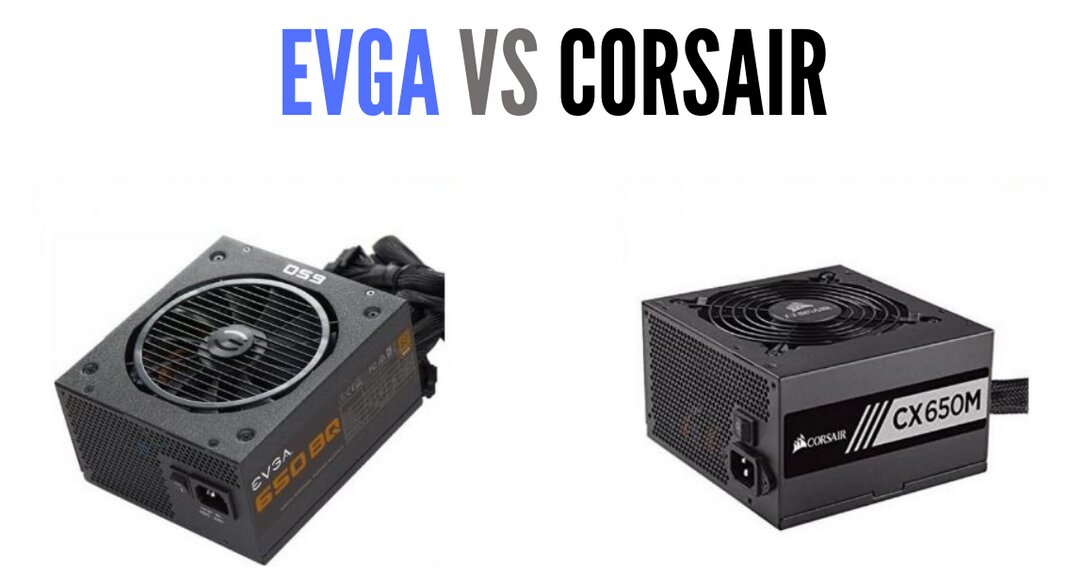EVGA PSUs
Rated: 8.5/10
Corsair PSUs
Rated: 8/10
- Both Corsair and EVGA make excellent power supplies for different budgets and power requirements.
- There are various factors to consider when buying a new PSU.
- EVGA is an old player in the PSU industry compared to Corsair.
- Which one you should get will depend greatly on your use case, budget and power requirements.
Most beginner builders gloss over the importance of an efficient power supply when researching parts for their PC. This is very troublesome as an inadequate PSU could damage itself and take your motherboard along with it. When it comes to buying PSUs, you might be wondering which brand to choose among various ones. In this article, we’ll be guiding you through the process of buying PSUs, as well as comparing two popular brands: EVGA vs Corsair PSU.
Factors To Consider When Buying a Power Supply
- Watts: Power supplies have a range of different wattages going up to 2000 watts and more. Although, for most standard gaming PCs, a PSU above 500 watts is enough and also a light on your wallet. As for overclocking, you can increase the wattage to accommodate for the extra power required by your components.
- Power Efficiency: The main factor affecting the performance of a power supply is its efficiency. Depending on the price, power supplies have a range of efficiencies arranged in an order. In the past, there were PSUs that had an efficiency rating below 80% which means the power could not be utilized completely. But thankfully, most modern power supplies have the ability to utilize more than 80% power.
- Warranty: Most modern PSUs have a very long lifespan hence their manufacturers provide large periods of warranty for consumers. For example, Corsair and EVGA provide a minimum of 3 years of warranty for their power supplies. This is because these are reputable companies, unlike premade builds which have a very small warranty.
- Form Factor: In the past, there were many different types of PSU sizes and forms but in modern power supplies, you just have to choose between ATX or SFX form factors. If you’re building a PC for the first time, most probably it’s a full tower or mid-tower build, you would go with the ATX which is the standard size of power supply that can fit in any ATX case.
- Noise Level: Power supplies come with fans of different sizes and RPMs. This can produce different levels of sound when put under load. Corsair and EVGA both have standard 120mm fans in their PSUs and you’ll find bigger sizes on higher-end supplies. These fans have smaller RPMs but are still enough to dissipate heat because of their large size.
750W: EVGA SuperNOVA 750 vs Corsair HX750i
EVGA SuperNOVA 750 G2 and Corsair HX750i are overall very similar in design and performance. Regarding the features, the Corsair HX750i is fully modular while the EVGA SuperNOVA 750 G2 is semi-modular. Each has its own 140mm fans which can be used for silent operation. There are some small differences between cable lengths due to different modular types.
Moving on, the EVGA G2 series has an 80+ gold rating so naturally, EVGA SuperNOVA 750 G2 does too. Similarly, the Corsair HX750i has an 80+ platinum rating putting it at a higher efficiency rating than the G2. Also, there’s a continuous power rating allowing you to utilize close to 750W easily. Both PSUs also come with a 10-year warranty.
650W: EVGA 650 BQ vs Corsair CX650M
Firstly, both PSUs have very similar features in that they’re both semi-modular, along with the same pre-attached cables. Also, both of them have the fans running continuously which produces a little noise. Some small differences include different cable lengths and fans. While the EVGA 650 BQ has a bigger 140mm cooling fan as compared to the Corsair CX650M’s 120mm fan. Lastly, the EVGA 650 BQ has a slightly longer cable than the Corsair CX650M.
Last but not least, Corsair CX650M is a bit pricier than the EVGA 650 BQ as of now which places the EVGA 650 BQ a bit higher in terms of value since both PSUs are nearly identical. Also, the EVGA 650 BQ has a larger 140mm fan allowing it to work more quietly with greater heat dissipation.
1000W: EVGA SuperNOVA 1000 G3 vs Corsair RM 1000x
The EVGA SuperNOVA 1000 G3 and Corsair RM 1000x are powerful PSUs with large overclocking capacity and can power multiple GPUs. In terms of features, both PSUs are fully modular with similar dimensions and a compact design. While the Corsair RM 1000x has a larger 160mm wire, the EVGA SuperNOVA contains a 150mm wire.
Moving on, both PSUs are based on continuous output so you can utilize nearly 1000W continuously. Their efficiency ratings are also very much the same. Both have an 80+ gold rating with 10+ years of warranty which is really reliable. Lastly, the price is quite fair for both PSUs but EVGA SuperNOVA 1000 G3 might be a bit more expensive. Couple that with a little louder sound as compared to the Corsair RM 1000x and Corsair wins this one.
Conclusion
In this EVGA vs Corsair PSU comparison, we compared different models of PSUs from both brands. EVGA and Corsair are both great brands for buying PSUs and offer PSU efficiencies rated from Platinum all the way down to Bronze. In the end, the brand doesn’t really matter since both are very reliable and reputable.
You can compare different models of PSUs from both brands and declare one as the winner but as a whole, there’s no clear winner. EVGA has some great PSUs at cheaper rates but produces a little more noise than Corsair while Corsair can get a bit pricier. It depends on your personal preference of whether you want a more compact PSU, silent operation, easy cable management, etc.
Thank you! Please share your positive feedback. 🔋
How could we improve this post? Please Help us. 😔
[Comparisons Expert]
Abdemanaf is a skilled creative writer who has been honing his craft since 2011. While initially working in different fields, he found a passion for technology and has been exploring the tech world since early 2015. Over the years, he has developed an in-depth knowledge of the latest tech trends and product offerings by various companies.
Abdemanaf’s writing reflects his analytical mindset and ability to think critically. He has a knack for breaking down complex technical information into easily digestible pieces, making his articles engaging and accessible to readers from all backgrounds. In February 2022, he joined Tech4Gamers as a blog and product comparison writer, where he has been able to hone his skills further.
As a writer, Abdemanaf is dedicated to staying up-to-date with the latest technological advancements and trends, enabling him to provide readers with the most relevant and accurate information. He is always eager to learn more and is constantly seeking new challenges to improve his skills.
Get In Touch: manaf@tech4gamers.com






![Do You Need A New PSU For RTX 4090? [Explained] New PSU For Nvidia GeForce RTX 4090](https://tech4gamers.com/wp-content/uploads/2022/11/New-PSU-For-Nvidia-GeForce-RTX-4090-218x150.jpg)
